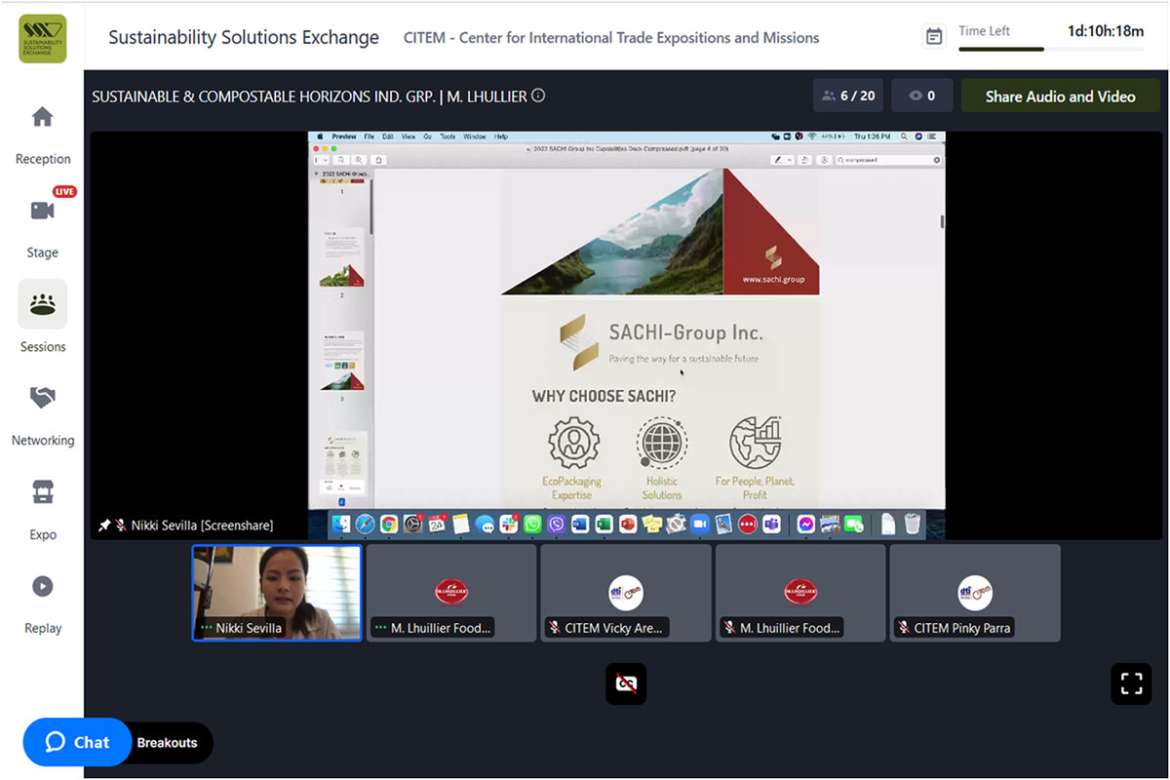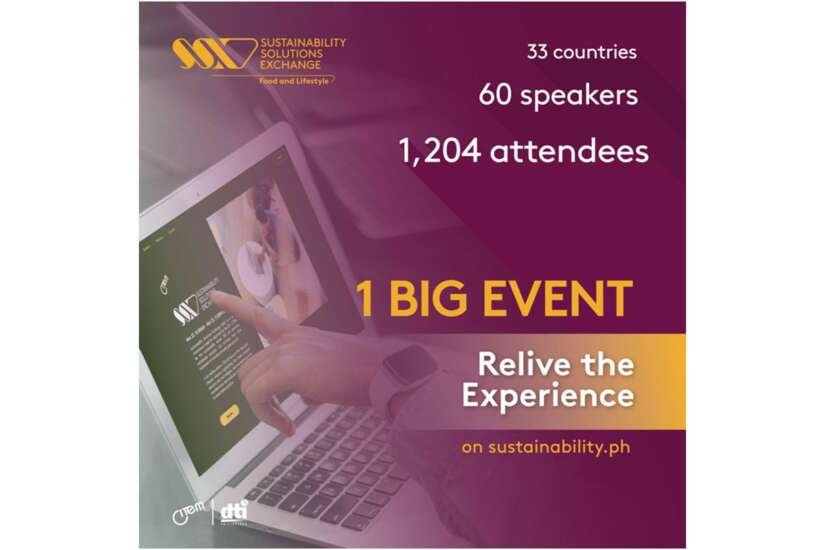Innovative business practices, green technologies, and contributing to a circular economy—these are some of the conversations that emerged during the recently concluded Sustainability Solutions Exchange (SSX), a three-day digital conference and exhibition initiated by the Center for International Trade Expositions and Missions (CITEM). The digital show gave emphasis to the food and lifestyle sectors, paving the way as the first government-led sustainability program for entrepreneurs in the Philippines.
SSX had more than 1,200 attendees hailing from 33 countries, making it one of CITEM’s most attended online events. More than 150 suppliers of sustainability solutions, products, and services signed up for the expo component. These suppliers came from the following industries: food, lifestyle, and packaging solutions; green technology; certifying bodies; alternative industrial products; inventions; and sustainable projects by the government, NGOs, academe, and other agencies.
CITEM Executive Director Pauline Suaco-Juan said that the reason behind launching SSX is to create a dialogue between Philippine MSMEs, solutions providers, industry experts, and sustainability advocates all over the world. “We aspire to not only promote competitive Philippine companies and products globally; we would like to champion brands that are socially conscious and sustainable,” she added.
A roster of 60 speakers composed of experts, stakeholders, and entrepreneurs addressed different sustainability issues through informative presentations and panel discussions. These local and international industry leaders presented topics that ranged from market opportunities and challenges, to business approaches and supply chain refinements.
Solutions Today: Goals and Strategies that underscore sustainability in the Philippine setting
The talks at SSX focused on how the Philippines fared in terms of sustainability, defining our local and global progress while offering available strategies and resources. They highlighted the role of businesses: from its product design, manufacturing, and distribution–and how MSMEs play a vital role in ultimately addressing global challenges through innovative projects.
The importance of familiarizing ourselves with the new 3Rs: Reusing, Repairing, and Refilling the Economy was mentioned by Resident Representative of the United Nations Development Programme (UNDP) in the Philippines, Dr. Selva Ramachandran. He explained, “This will entail a concerted action from all stakeholders to facilitate producers designing products for reuse, refilling, repair, and recycling where the government uses its purchasing power to buy sustainable products and communities demanding access to better choices for consumption.”
“It is about understanding how we work together in harmony with nature,” Cherrie Atilano of AGREA, a Marinduque-based agri-business founded on sustainable agriculture and fair-trade, said. She discussed adopting the Five Action Tracks that the United Nations’ Food Systems implemented in 2021. “How we produce together and feed the growing population, that we’re not actually destroying nature but managing and really making sure we are protecting it. But also making sure that we’re addressing food security, gender inclusivity, sustainability, and climate resiliency,” she added, underscoring the interconnection of various issues where sustainability plays a critical role.
The Philippines’ key leadership role in taking steps towards a circular economy was lauded by Christian Kaufholz of the World Economic Forum. He said that “The transition to a circular economy is one of the greatest challenges of our time, and it will only happen when a diversity of relevant voices are heard and form part of the solution. SSX shows, with this event, that the Philippines is taking a leadership role in elevating and addressing the challenges and solutions related to building a truly circular world.”
Rediscovering and shaping the Food Systems for Tomorrow
During Day 2, the conference emphasized creating a circular approach to a linear food system. Experts discussed how we can restore its origins and mitigate environmental concerns surrounding existing practices. The talks also covered how we can create solutions on food loss by adapting creative solutions from the processing, packaging, and storing to consumption and proper waste management.
“One of the promising trends right now is more and more food companies are integrating sustainability to redefine their long-term value plan,” Climate Change and Sustainability Services, SVG & Co.’s Associate Director Diana Rose Sadili said. “The context of sustainability for food companies is far more than a buzzword right now, since more consumers nowadays are actually getting more concerned to know that food companies are taking sustainability seriously. And while the food system is complex, food companies are facing challenges in addressing their sustainability goal.” she further noted, covering Food Sustainability and its growing market in her talk.
Cutting-edge technology that aids sustainable food production was shared by Thinking Machines’ Director for Social Impact and Sustainability, Pia Faustino. She described how computers can be trained to recognize visual patterns and produce aerial views of land and forest covers at high resolution. For Pia, the use of geospatial data science to scale-out food production could help improve crop yields, reduce greenhouse gas emissions from agricultural production, and increase the resilience of smallholder farms.
An inclusive approach on transformative agriculture was shared by Toby Tamayo of Lotus Valley Farms and Environment. He said that it is a pillar that should involve the whole family and the community. “In communities where you live, it is important to share seeds and share certain tasks. If you get to do the work together, the task of agriculture becomes easier. This is what we know as bayanihan spirit in the past.”
New Living and Consumption aimed towards responsible innovation
The third day of the conference focused on the lifestyle sector. The market demands for products and services, as well as policies and standards that will guide MSMEs were dissected. Industry experts zeroed in on ethical business practices, the need for circular materials, and other approaches that are kinder to the people and planet. The last day of SSX was designed to guide Filipino businesses to maximize the opportunities amid the growing global demand.
“We are actually in the beginning stage,” Vice President of Asia Textile Mills, Inc. (ASIATEX), Matthew “Chuck” Lazaro said. “There’s so many things to improve and there are more applications, processes, systems and standards to identify. There’s so much to do. Therefore, I must say, there’s so much to share on this program. The COVID crisis brought about challenges that taught us one good lesson and that is—we all could be caring and responsible.” he added, sharing about the company’s Sustainability journey.
“The materials we are considering are regenerable. Two of them, in fact—banana pseudostem and pineapple leaves—are agricultural wastes and do not take up new planting ground,” Philippine Textile Research Institute (PTRI) Director Celia Elumba said, discussing their sustainability efforts and new technology. “But while we have the natural textile fiber (NTF) resources, the supply chain has remained undeveloped. This is where the institute has put its focus: on the development of the textile ecosystem starting with the conversion of NTFs into input material.” she noted.
On the last day of SSX, Design Center of the Philippines (DCP) launched the inaugural collections of their Bakong and Pinyapel initiatives under their Smart Materials Innovation Program. These projects seek to find relevant use for agricultural waste and byproducts such as the perennial aquatic plant bakong and discarded pineapple leaves. “Design Center’s Smart Materials Program is aimed at utilizing agricultural waste as a source of innovative materials for tomorrow’s products; and at the Sustainability Solutions Exchange, we are showcasing the years’ work that we have done at Design Center together with our wonderful team of collaborators on sustainable design by zeroing in on the essential building block of design: its materials.” Executive Director Rhea Matute said. These two initiatives also captured interest as the respective expo booths that garnered the highest number of attendee interactions.
The range of speakers from both public and private sectors demonstrate the amount of intersectoral efforts needed and the importance of each endeavor that creates an impactful ripple.
According to Fortune Business Insights, the global green technology and sustainability market is projected to grow from USD 11.43 billion in 2021 to USD 41.62 billion in 2028 at a Compound Annual Growth Rate of 20.3% during the 2021-2028 period. This is why the digital event is geared towards Micro, Small, and Medium-scale Enterprises or MSMEs–in order for them to smoothly transition into becoming export-ready brands that practice ethical, sustainable policies and effectively cater to this growing market.
Shifting the paradigm by converging a network of sustainability advocates

The inaugural edition of SSX, aside from its exhibition and conference fronts, also offered different ways for participants–entrepreneurs, solutions providers, speakers, and guests–to meet and exchange ideas. CITEM was able to arrange more than 70 business-to–business (B2B) meetings during the event, with the goal of matching suppliers with MSME participants and buyers.
After its successful launch, SSX organizers will continue to push for circular Filipino businesses through its online channels. The sustainability.ph website will serve as a one-stop hub for industry news and insights. It is also the first local sustainability directory of vetted sustainable solutions, products, and services. Advocates can follow the SSX social media platforms for the latest happenings in the sustainability sector.
As the pioneer program on sustainability spearheaded by the government, SSX is committed to equip and produce local businesses that will uphold circular practices in their systems–ultimately mobilizing them to actively take part in taking steps to a circular economy and being the change makers who empower the people and planet. The talks and discussions during the three-day exhibition and conference are available on demand via the Hopin Replay section until April 20 and will also be available on the sustainability.ph website on April 22, coinciding with Earth Day.
About CITEM
The Center for International Trade Expositions and Missions (CITEM) is the export promotion arm of the Philippine Department of Trade and Industry (DTI). CITEM has established the country’s image as the premier destination for quality export products and services. It continues to set the highest standards of creativity, excellence, and innovation to achieve export competitiveness in the international market.
To contribute to the advancement of the United Nations Sustainable Development Goals (UN SDGs), CITEM launches the Sustainability Solutions Exchange (SSX), a community to exchange ideas and solutions with the goal to advance Philippine businesses towards sustainable growth. By 2030, SSX aims to become a globally recognized trade and community platform for sustainable products and solutions. The event will consist of various digital components such as the Exhibition, Conference, Business Matching, and other special activities.

